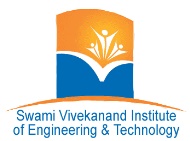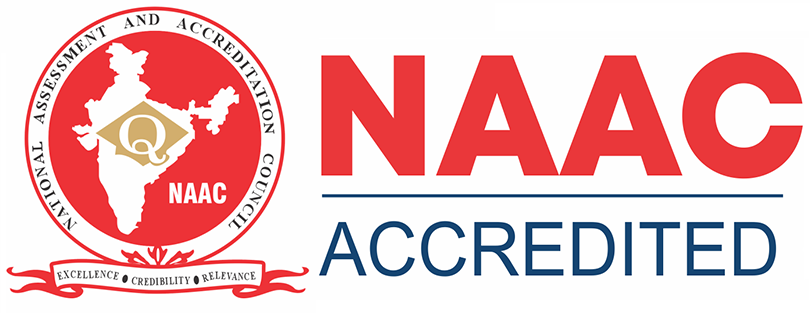Programmes
| Course Name | B.Tech in Computer Science & Engineering |
| Level | UG (Intake: 240) |
| Year of Approval | 2004 |
Programme Outcomes (POs)
PO1: Engineering knowledge: Apply the knowledge of mathematics, science, engineering fundamentals, and an engineering specialization to the solution of complex engineering problems.
PO2: Problem analysis: Identify, formulate, research literature, and analyze complex engineering problems reaching substantiated conclusions using first principles of mathematics, natural sciences, and engineering sciences.
PO3: Design/development of solutions: Design solutions for complex engineering problems and design system components or processes that meet the specified needs with appropriate consideration for public health and safety, and cultural, societal, and environmental considerations.
PO4: Conduct investigations of complex problems: Use research-based knowledge and research methods including the design of experiments, analysis and interpretation of data, and synthesis of information to provide valid conclusions.
PO5: Modern tool usage: Create, select, and apply appropriate techniques, resources, and modern engineering and IT tools including prediction, and modeling to complex engineering activities with an understanding of their limitations.
PO6: The engineer and society: Apply reasoning informed by contextual knowledge to assess societal, health, safety, legal and cultural issues and the consequent responsibilities relevant to professional engineering practice.
PO7: Environment and sustainability: Understand the impact of the professional engineering solutions in societal and environmental contexts, and demonstrate knowledge of, and need for sustainable development.
PO8: Ethics: Apply ethical principles and commit to professional ethics and responsibilities and norms of engineering practice.
PO9: Individual and team work: Function effectively as an individual and as a member or leader in diverse teams and in multidisciplinary settings.
PO10: Communication: Communicate effectively on complex engineering activities with the engineering community and society at large, such as, by comprehending and writing effective reports and design documentation, making effective presentations, and giving and receiving clear instructions.
PO11: Project management and finance: Demonstrate knowledge and understanding of engineering and management principles and apply them to one’s own work – as a member and leader in a team – to manage projects and in multidisciplinary environments.
PO12: Life-Long Learning: Recognize the need for, and have the preparation and ability to engage in independent and lifelong learning in the broadest context of technological change.
Programme Educational Objectives (PEOs)
PEO 1: Become competent Computer Professionals.
PEO 2: Have abilities to analyze the requirements of software and provide solutions through efficient product designs.
PEO 3: Have successful career and meet the requirements of Indian and other MultiNational Companies.
PEO 4: Have exposure to advanced technologies, technical skills and opportunities to work as team members on multidisciplinary projects.
Programme Specific Objectives (PSOs)
PSO1: To use principles of Computer Science & Engineering (such as software engineering, computer networks, data structures & computer programming high level languages) for developing software solutions..
PSO2: To clearly understand the concept of programming languages, computer architecture and their applications in different field of technologies to develop costeffective solutions in the area of computer science by the use of various methodological algorithms and different tools.
| Course Name | B.Tech in Computer Science & Design |
| Level | UG (Intake: 60) |
| Year of Approval | 2023 |
Programme Outcomes (POs)
PO1: Engineering knowledge: Apply the knowledge of mathematics, science, engineering fundamentals, and an engineering specialization to the solution of complex engineering problems.
PO2: Problem analysis: Identify, formulate, research literature, and analyze complex engineering problems reaching substantiated conclusions using first principles of mathematics, natural sciences, and engineering sciences.
PO3: Design/development of solutions: Design solutions for complex engineering problems and design system components or processes that meet the specified needs with appropriate consideration for public health and safety, and cultural, societal, and environmental considerations.
PO4: Conduct investigations of complex problems: Use research-based knowledge and research methods including the design of experiments, analysis and interpretation of data, and synthesis of information to provide valid conclusions.
PO5: Modern tool usage: Create, select, and apply appropriate techniques, resources, and modern engineering and IT tools including prediction, and modeling to complex engineering activities with an understanding of their limitations.
PO6: The engineer and society: Apply reasoning informed by contextual knowledge to assess societal, health, safety, legal and cultural issues and the consequent responsibilities relevant to professional engineering practice.
PO7: Environment and sustainability: Understand the impact of the professional engineering solutions in societal and environmental contexts, and demonstrate knowledge of, and need for sustainable development.
PO8: Ethics: Apply ethical principles and commit to professional ethics and responsibilities and norms of engineering practice.
PO9: Individual and team work: Function effectively as an individual and as a member or leader in diverse teams and in multidisciplinary settings.
PO10: Communication: Communicate effectively on complex engineering activities with the engineering community and society at large, such as, by comprehending and writing effective reports and design documentation, making effective presentations, and giving and receiving clear instructions.
PO11: Project management and finance: Demonstrate knowledge and understanding of engineering and management principles and apply them to one’s own work – as a member and leader in a team – to manage projects and in multidisciplinary environments.
PO12: Life-Long Learning: Recognize the need for, and have the preparation and ability to engage in independent and lifelong learning in the broadest context of technological change.
Programme Educational Objectives (PEOs)
PEO 1: Graduates will be well-prepared for careers in the IT industry and related fields, demonstrating a strong foundation in computer science principles and practices
PEO 2: Graduates will be able to analyze, design, and implement solutions to complex computational problems using modern tools and technologies.
PEO 3: Graduates will be equipped with the skills to adapt to evolving technological landscapes, pursue lifelong learning, and contribute to innovation in the field.
PEO 4: Graduates will exhibit professional ethics, teamwork, and communication skills, enabling them to contribute effectively in diverse professional settings.
Programme Specific Objectives (PSOs)
PSO1: Graduates will be proficient in programming languages, software development methodologies, and database management systems.
PSO2: Graduates will be able to apply their knowledge of computer networks, operating systems, and cyber security principles to design and implement secure and reliable systems.
PSO3: Graduates will be able to analyze and interpret data using various computational
techniques, contributing to data-driven decision-making.
PSO4:Graduates will be able to develop and deploy web and mobile applications,
leveraging their understanding of front-end and back-end technologies.
| Course Name | B.Tech in Artificial Intelligence |
| Level | UG (Intake: 60) |
| Year of Approval | 2025 |
Programme Outcomes (POs)
PO1: Engineering knowledge: Apply the knowledge of mathematics, science, engineering fundamentals, and an engineering specialization to the solution of complex engineering problems.
PO2: Problem analysis: Identify, formulate, research literature, and analyze complex engineering problems reaching substantiated conclusions using first principles of mathematics, natural sciences, and engineering sciences.
PO3: Design/development of solutions: Design solutions for complex engineering problems and design system components or processes that meet the specified needs with appropriate consideration for public health and safety, and cultural, societal, and environmental considerations.
PO4: Conduct investigations of complex problems: Use research-based knowledge and research methods including the design of experiments, analysis and interpretation of data, and synthesis of information to provide valid conclusions.
PO5: Modern tool usage: Create, select, and apply appropriate techniques, resources, and modern engineering and IT tools including prediction, and modeling to complex engineering activities with an understanding of their limitations.
PO6: The engineer and society: Apply reasoning informed by contextual knowledge to assess societal, health, safety, legal and cultural issues and the consequent responsibilities relevant to professional engineering practice.
PO7: Environment and sustainability: Understand the impact of the professional engineering solutions in societal and environmental contexts, and demonstrate knowledge of, and need for sustainable development.
PO8: Ethics: Apply ethical principles and commit to professional ethics and responsibilities and norms of engineering practice.
PO9: Individual and team work: Function effectively as an individual and as a member or leader in diverse teams and in multidisciplinary settings.
PO10: Communication: Communicate effectively on complex engineering activities with the engineering community and society at large, such as, by comprehending and writing effective reports and design documentation, making effective presentations, and giving and receiving clear instructions.
PO11: Project management and finance: Demonstrate knowledge and understanding of engineering and management principles and apply them to one’s own work – as a member and leader in a team – to manage projects and in multidisciplinary environments.
PO12: Life-Long Learning: Recognize the need for, and have the preparation and ability to engage in independent and lifelong learning in the broadest context of technological change.
Programme Educational Objectives (PEOs)
PEO 1: Become competent Computer Professionals.
PEO 2: Have abilities to analyze the requirements of software and provide solutions through efficient product designs.
PEO 3: Have successful career and meet the requirements of Indian and other MultiNational Companies.
PEO 4: Have exposure to advanced technologies, technical skills and opportunities to work as team members on multidisciplinary projects.
Programme Specific Objectives (PSOs)
PSO1: To use principles of Computer Science & Engineering (such as software engineering, computer networks, data structures & computer programming high level languages) for developingsoftware solutions
PSO2: To clearly understand the concept of programming languages, computer architecture and their applications in different field of technologies to develop costeffectives solutions in the area of computer science by the use of various methodological algorithms and different tools.
| Course Name | M.Tech in Computer Science |
| Level | PG (Intake: 24) |
| Year of Approval | 2009 |
Programme Outcomes (POs)
PO1: An understanding of the theoretical foundations and the limits of computing.
PO2: An ability to adapt existing models, techniques, algorithms, data structures, etc. for efficiently solving problems.
PO3: An ability to design, develop and evaluate new computer based systems for novel applications which meet the desired needs of industry and society.
PO4: Understanding and ability to use advanced computing techniques and tools.
PO5: An ability to undertake original research at the cutting edge of computer science & its related areas.
PO6: An ability to function effectively individually or as a part of a team to accomplish a stated goal.
PO7: An understanding of professional and ethical responsibility.
PO8: An ability to communicate effectively with a wide range of audience.
PO9: An ability to learn independently and engage in lifelong learning.
PO10: An understanding of the impact of IT related solutions in an economic, social and environment context.
Programme Educational Objectives (PEOs)
PEO1: Advancing Knowledge – Graduates will contribute to the advancement of knowledge in their chosen field through research, innovation, and development.
PEO2: Professional Practice – Graduates will be equipped to apply their knowledge and skills in professional settings, whether in industry, academia, or research institutions.
PEO3: Leadership and Collaboration – Graduates will be able to lead and collaborate effectively in diverse teams and contribute to multidisciplinary projects.
PEO4: Lifelong Learning – Graduates will have the ability and motivation to engage in continuous learning and adapt to the evolving landscape of their field.
PEO5: Ethical and Societal Impact – Graduates will demonstrate ethical conduct and consider the societal impact of their work.
Programme Specific Objectives (PSOs)
PSO1: Specialized Knowledge – Graduates will possess in-depth knowledge and understanding of the core concepts and advanced theories in their chosen specialization.
PSO2: Research and Analytical Skills – Graduates will be able to conduct research, analyze data, and solve complex problems using appropriate methodologies and tools.
PSO3: Design and Development – Graduates will be able to design and develop innovative solutions for engineering problems, considering various constraints and requirements.
PSO4: Technical Communication – Graduates will be able to communicate their technical knowledge and ideas effectively through written and oral presentations.
PSO5: Adaptability and Innovation – Graduates will be able to adapt to new technologies and contribute to the development of innovative solutions in their field.





